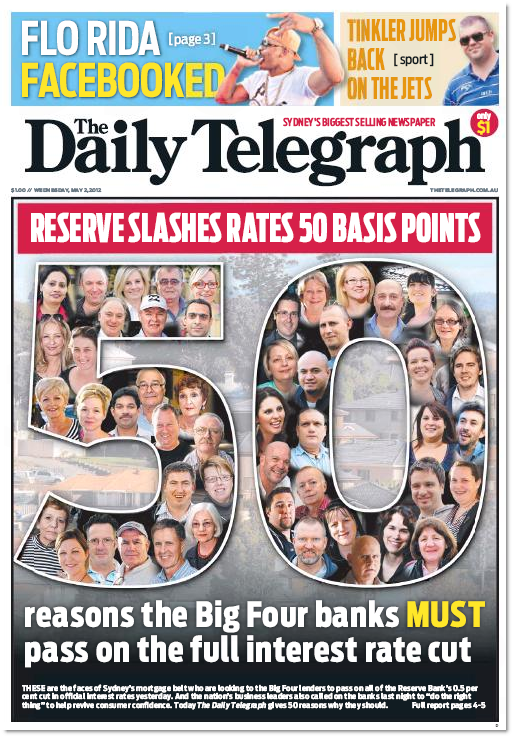Yesterday’s papers provided us with a nice contrast in competing realities:
— The Daily Telegraph‘s 50 reasons why the banks should pass on the full RBA rates cut:

Alongside …
— News.com.au‘s story entitled “Aussies better off than ever“, detailing a new AMP.NATSEM Income and Wealth Report that found the average Aussie family was $224 better off a week in real terms than in 1984.
So which is it? we asked Bernard Keane and Eva Cox today. Are we rich or poor? Are we hurting or do we need to adjust our expectations? Is it reasonable to carp on about a 50 cent price rise on our latte because “heavy rain wiped out crops in Central America”, for starters?
Turns out, it’s all about the vibe.
Cox writes today:
“The trouble with economists has always been that they don’t do feelings. Most assume we are rational and self-interested, as well as being capable of the necessary calculations that allow us to do the sums. On that basis, we ought to know we have more money and know that our standard of living is improving if we spend more on discretionary items … [but] people’s reactions to their financial situation will be affected by how they feel about a range of issues and may create misperceptions of our relative situation. Research also shows we compare ourselves with how we see others, rather than count what we have.”
Cue the politics of envy. As Keane writes:
“No politician is willing to tell the truth, to make the obvious point that Australians are richer than ever before and should be grateful that economic reform paved the way for such a big rise in incomes, rather than whingeing about not being able to afford the wealthy lifestyles they want. Such a politician would be instantly declared ‘out of touch’. The last politician who tried that was John Howard, not long before he lost his own seat. His example has been heeded by everyone he left behind in parliament.”
But there’s a silver lining to our carping, as outlined by Craig Meller, managing director of AMP Financial Services, in the foreword of the Income and Wealth report study:
“Debate around the cost of living is unlikely to abate any time soon but it’s reassuring to know that a lot of what we are spending our money on are things that allow us to spend more time with our friends and families. If spending money on a holiday means quality time with our family, eating out means sharing a meal with friends and the latest smartphone means improved communication with those that matter to us then we are almost certainly living richer lives.”
And to think John Howard dared to say we’ve never had it so good. The cheek.







In general terms most people will always be better off under a Labor Government, lower interest rates (now the lowest for many years), lower unemployment, better pensions; and more (discretionary) money to spend. Beware of a mean spirited Coalition Abbott/Hockey government in waiting lurking around the corner in 2013. You vote for an Abbott government and Joe Hockey will “whack you”; Hockey has already indicated and insisted (whilst visiting the UK and safely away from mainstream media reporting in Australia) that all types of pensions and social payments will always be lower under his watch. More money will be spent on towing refugee boats back to Indonesia – see the Julie Bishop item further on in todays Crikey. More money will also be allocated and spent on corporate welfare by reducing mining taxes etc. Just ask Clive, Twiggy and Gina.
“And to think John Howard dared to say we’ve never had it so good. The cheek.”
Did Howard really say that? He would have certainly been aware that it came back to haunt the conservative politician, Harold Macmillan who did say it:
[(en.wikipedia.org/wiki/Harold_Macmillan#Never_So_Good_.282008.29)
In his Bedford speech of July 1957 he told the nation they had ‘never had it so good’, but warned of the dangers of inflation, summing up the fragile prosperity of the 1950s.]
What? A Crikey editorial that is sympathetic to John Howard? There’s hope for you guys yet!
Are interest rates the “real” financial drag the primary media raves on about ? How come economists can’t see the “available” cash in the various stratas of society ? For example, that strata not working but drawing “benefits” who seem to have cash for alcohol, smokes and poker machines plus living a beach lifestyle ? Certainly rent and food costs affect families, but to what extent if you take away luxury items such as the second car. And finally, just how much does a home owner pay in taxes and charges for utilities ? I think there is a looming poverty line right there.
DAVID H: For heaven’s sake David re-read Keane’s italicised comment. He was saying the opposite to what you have said.